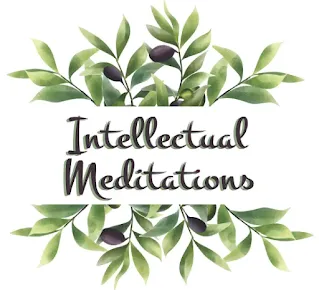
Parmenides • on Well Being
This principle later came to be known in logic as the "principle of identity" or the "principle of non-contradiction." Parmenides was the first to conceive of this principle and elevated it to a criterion for rational thought. It is the principle upon which mathematics and the sciences were founded.
For Parmenides, "being" is "unborn" and "indestructible," and "thinking" is the necessary link to "being." He also believes that the senses can give people false images or false representations of the world.
"unborn, imperishable, whole, uniform, unchanging, perfect, all together, one, continuous, indivisible, because it is all, similar, motionless, without beginning or end, remaining the same, in the same place, it stands alone, and so, firmly it will remain. For Necessity holds it in the bonds of limit, which surrounds it all around."
a sprinkle of _self
• "Way of Opinion" is a similar concept, emphasizing that our beliefs and opinions about the world and are often subject to change, error, or distortion. which may not necessarily reflect the ultimate reality.
So, if we have three paths, then the path of opinion is the intermediate; it is between the path of appearances or impressions and the path of truth.
On the path of appearance, we have the beliefs and convictions that arise through sensory perception. Phenomena. The shadows in the cave.
On the path of truth, we have only what is of Reality. That which is independent of the perceptions of appearance or our beliefs. It is the objective and absolute truth.
The path of opinion is the middle path. As the author says "it is neither true nor false". The one who walks on the path of opinion desires to strip away appearances. It is the effort through dialectic or deductive reasoning to create an Opinion about the truth or to ultimately experience the truth.
❈ We can walk the Way of Opinion in the two following ways :
• The personal work : When logic is used on the path of opinion, the appearances/impressions that have been created by the self or espoused, will be gradually removed, or at least cleared according to the intellectual capabilities of the working self.
• The interpersonal work : When dialectic is used on the path of opinion, by using another self, the appearances/impressions that have been created or espoused, up to that point, as to what is true, will be discarded.
As to summarize my syllogism,
• if we have three paths, the first
is the path of truth and absolute Reality.
• Second is the path of opinion, where some type of reasoning is used to attempt to reach the truth or at least form an opinion about the truth with as few appearances as possible.
• Third is the path of appearance, which is the path of simple
human experience that typically creates phenomena.
Cherry-on-top :
From a different perspective, if we set Truth to be Oneness, from a path we walk on or within which we work, it becomes the objective environment in which we live.
Within this environment, we have two possible ways to walk.
• The way of Appearances, i.e. impressions, which creates a world of phenomena sourcing to the simple human experience.
• The path of Opinion, i.e., logic and reasoning, with which we try to remove the appearances we have espoused or created, and reach the point where we experience the Truth.
In the pursuit of well-being, Parmenides' philosophy serves as a guiding beacon, shedding light on the nature of true existence. His unwavering belief in the oneness and permanence of Being underscores the importance of seeking perfection and enduring truths.
To achieve balance on the path of truth and attain spiritual benefits, one must first embrace the idea that all is one and that change and multiplicity are mere illusions. Three key ways to achieve such balance are:
- Embrace Reason and Knowledge : Parmenides emphasized the primacy of reason and knowledge as the means to unravel the mysteries of existence. By relying on the power of reason, we can transcend the deceptive appearances of the world and find genuine understanding.
- Reject Illusory Beliefs : To reach the essence of well-being, one must discard the deceptive beliefs in change, birth, and decay. Parmenides teaches us to recognize the illusory nature of ordinary experiences and to look beyond the surface to discover the unchanging truth.
- Seek the Perfection of the One : Parmenides' One, described as "unborn, imperishable, whole, uniform, and unchanging," stands as the epitome of true existence. By focusing on the perfection and unity of this singular reality, we can attain a sense of spiritual completeness and ultimate well-being.
In embracing these principles and embarking on the path of reason and knowledge, we can transcend the superficial appearances of the world and, in doing so, find genuine well-being in the unchanging, indivisible reality that Parmenides extolled.
#CosmicWisdomGr • Parmenides
Articles Index • Philosopher's threshold
#CWGR Archway
Intellectual Meditations
delve into the Essence of Universal Truths,
expand your mental horizons towards infinity,
and experience Cosmic Forms & Ideas.
Follow noetic trails that lead you to Cosmic horizons
& cultivate your Spirit via the path of Intellect.
Meditate on and Contemplate with,
concepts & theories, symbols & archetypes.
An intro guide is available here.




.png)
